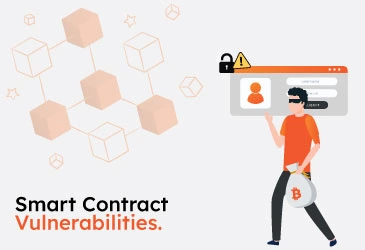Web 3.0 Business Opportunities To Excel In Digital Landscape
Updated : July 20, 2023

In the ever-evolving digital landscape, we have witnessed remarkable transformations in the way we connect, communicate, and conduct business. As technology advances, new paradigms emerge, and one such paradigm that is gaining momentum is Web 3.0 business opportunities. 🚀 Being security experts we offer reliable smart contract auditing services to secure your projects.
In this article, we will explore the concept of Web 3.0 and delve into the exciting business prospects it presents.
What Is Web 3?
Web 3.0 represents the next generation of the internet, characterized by decentralized and user-centric platforms that empower individuals, enhance data privacy, and revolutionize business models. With its potential to disrupt traditional industries and create innovative opportunities, Web 3.0 is a space that entrepreneurs, investors, and businesses should pay close attention to.
Examples Of Web 3.0
-
Decentralized Finance (DeFi)
Web 3 introduces decentralized finance, where individuals can access financial services without intermediaries. Through decentralized lending, borrowing, and exchanges, users can take control of their finances and participate in global markets with transparency and efficiency.
-
Non-Fungible Tokens (NFTs)
Web 3 enables the creation and trading of non-fungible tokens. NFTs represent unique digital assets such as artwork, collectibles, or virtual real estate. This opens up new avenues for artists, creators, and businesses to monetize digital content and establish ownership of digital assets.
-
Decentralized Applications (dApps)
Web 3 allows the development and deployment of decentralized applications. These dApps operate on blockchain technology, offering enhanced security, transparency, and autonomy. They can disrupt various industries, including finance, supply chain, healthcare, and more, by eliminating the need for intermediaries and introducing new business models
What Is The Future Of Web3?
"The web as I envisaged it, we have not seen it yet. The future is still so much bigger than the past." - Tim Berners-Lee, Inventor of the World Wide Web
The World Wide Web, introduced by Sir Tim Berners-Lee in 1989, brought about a revolution in the way information was accessed and shared. Web 1.0, the early version of the internet, was primarily static and one-way, with limited user interaction. However, with the emergence of Web 2.0, a shift occurred. Websites became more dynamic, enabling user-generated content, social networking, and interactive experiences. Platforms like Facebook, Twitter, and YouTube exemplify the Web 2.0 era.
-
The Promise of Web 3.0
Now, imagine a web where users have greater control over their data, where trust and transparency are built-in features, and where decentralized applications (dApps) provide seamless and secure experiences. This is the essence of Web 3.0, also known as the Semantic Web or the Decentralized Web.
-
The Power of Decentralization
🌐 "In a decentralized world, power comes from the network, not a central authority." - Naval Ravikant, Entrepreneur and Investor
One of the key pillars of Web 3.0 is decentralization. Traditional Web 2.0 platforms centralize power, control user data, and often monetize it without explicit user consent. In contrast, Web 3.0 leverages blockchain technology and distributed ledger systems to decentralize data storage, enhance privacy, and enable peer-to-peer interactions. This paradigm shift offers tremendous opportunities for businesses to reimagine their models and deliver value directly to their users
-
Smart Contracts and the Rise of dApps
📱💡 "With smart contracts, the need for intermediaries disappears. It's trustless, it's secure, and it's transparent." - Vitalik Buterin, Co-founder of Ethereum
Web 3.0 introduces smart contracts, self-executing agreements with predefined rules encoded on the blockchain. Smart contracts enable the development of decentralized applications (dApps) that operate autonomously, free from third-party control. These dApps can revolutionize industries such as finance, supply chain, healthcare, and more. With Web 3.0, businesses can explore the potential of creating innovative solutions and harness the benefits of blockchain technology.
Web 3.0 Business Opportunities: A World of Possibilities 💼
The advent of Web 3.0 opens up a plethora of business opportunities across various sectors. Let's explore some of the key areas where entrepreneurs and businesses can capitalize on this transformative shift.
-
Decentralized Finance (DeFi) and Banking for the Unbanked
🏦💰 "With DeFi, we can bring financial services to those who are unbanked or underbanked, enabling greater financial inclusivity." - Unknown
Decentralized Finance, or DeFi, has emerged as one of the most promising and disruptive applications of Web 3.0. DeFi leverages blockchain technology to provide financial services without the need for intermediaries, such as banks. Through decentralized lending and borrowing, decentralized exchanges, and yield farming, DeFi empowers individuals to take control of their finances, bypass traditional gatekeepers, and access financial services with greater transparency and efficiency.
Additionally, Web 3.0 allows us to address the issue of financial exclusion by providing banking services to the unbanked and underbanked populations around the world. With a smartphone and an internet connection, individuals can access decentralized banking services, participate in global markets, and enjoy the benefits of a financial system that is open to all.
-
NFTs and the Digital Economy
🖼️📈 "NFTs have the potential to revolutionize the art world, creating new revenue streams for artists and transforming the way we perceive and own digital assets." - Unknown
Non-Fungible Tokens (NFTs) have taken the world by storm, driving a wave of innovation in the digital economy. NFTs are unique digital assets that can represent ownership or proof of authenticity for digital and physical items. From art and collectibles to virtual real estate and intellectual property, NFTs unlock new possibilities for creators, collectors, and businesses alike
Artists can tokenize their work, allowing for direct sales and royalties on secondary market transactions. Businesses can benefit from NFTs for limited-edition merchandise and loyalty programs. Moreover, NFTs provide a new way to monetize digital content, such as music, videos, and virtual experiences. With Web 3.0, the boundaries of the digital economy are expanding, offering entrepreneurs the chance to pioneer new business models and revenue streams.
-
Supply Chain and Traceability
📦🌍 "Web 3.0 can enhance supply chain transparency, enabling consumers to make informed choices and hold businesses accountable for ethical and sustainable practices." - Unknown
Global supply chains are often complex and opaque, making it challenging for consumers to trace the origins and journey of products. Web 3.0 introduces the potential for greater supply chain transparency and traceability by leveraging blockchain technology. Through immutable and auditable records, businesses can provide real-time visibility into their supply chains, ensuring ethical sourcing, fair trade, and sustainable practices.
Consumers, armed with this information, can make more informed purchasing decisions, supporting businesses that align with their values. This shift towards transparency not only promotes trust but also serves as a competitive advantage for businesses that prioritize social and environmental responsibility.
-
Enhanced Privacy and Data Ownership
🔒🔑 "Web 3.0 empowers individuals to take control of their data, enabling greater privacy, security, and ownership over personal information." - Unknown
In the age of data breaches and privacy concerns, Web 3.0 offers a much-needed solution. With decentralized identity systems, individuals can manage and control their personal data, granting access on a need-to-know basis. Blockchain-based solutions ensure that sensitive information is encrypted, tamper-proof, and accessible only with the user's consent
By prioritizing privacy and data ownership, businesses can build trust with their users and differentiate themselves in the market. Web 3.0 provides an opportunity to pivot towards user-centric models, where individuals have agency over their digital identities and are rewarded for sharing data when they choose to do
-
Enhanced Digital Advertising and User Engagement
📣📊 "Web 3.0 offers a paradigm shift in digital advertising, where users have control over their data and advertisers can deliver targeted and personalized campaigns." - Unknown
Web 3.0 introduces a new era of digital advertising that prioritizes user privacy and consent. With decentralized identity solutions, users can choose to share their data with advertisers in a secure and transparent manner. This enables advertisers to deliver more targeted and personalized campaigns, ensuring that users receive relevant content while maintaining control over their information
Moreover, Web 3.0 opens up avenues for innovative advertising models, such as microtransactions and incentivized engagement. Users can be rewarded with tokens or digital assets for their attention, and participation, or for sharing their data. This shift in advertising dynamics promotes a more equitable and engaging relationship between users, advertisers, and content creators.
Challenges and Considerations in Web 3.0 Business Ventures
Research states that Web 3.0 business options come with various challenges and considerations. Let’s have a look at them:
-
Regulatory and Legal Landscape
🔒📜 "As Web 3.0 evolves, policymakers and regulators will need to adapt to ensure consumer protection, privacy, and fair competition." - Unknown
The decentralized nature of Web 3.0 poses challenges for existing regulatory frameworks. As businesses explore new models and technologies, it is crucial to stay informed about evolving regulations and compliance requirements. Engaging with policymakers and industry stakeholders can help shape the regulatory landscape and ensure the responsible and ethical growth of Web 3.0 ventures.
-
Scalability and User Experience
⚙️🖥️ "Scalability remains a significant challenge in Web 3.0, and businesses need to prioritize seamless user experiences to drive adoption." - Unknown
Blockchain and its alternatives, while promising, still face scalability limitations. The current state of some blockchain networks may result in slower transaction speeds and higher fees. Businesses should carefully consider the scalability of their solutions and focus on optimizing user experiences to overcome these challenges. Collaborating with developers, researchers, and the wider blockchain community can lead to innovative solutions that enhance scalability and user satisfaction.
-
Education and Awareness
🎓🌐 "Education plays a crucial role in the adoption and success of Web 3.0. Businesses should focus on creating awareness and providing resources to help users understand the value proposition." - Unknown
Web 3.0 represents a paradigm shift, and educating users about its benefits and potential is vital for widespread adoption. Businesses should invest in educational initiatives, tutorials, and user-friendly interfaces that demystify blockchain technology and make it accessible to a broader audience. By prioritizing education and awareness, businesses can bridge the knowledge gap and foster trust and confidence in Web 3.0 applications.
Avail web 3 business opportunities & secure your project
In the rapidly evolving digital landscape, Web 3.0 business opportunities have emerged as a transformative force. With its decentralized infrastructure and smart contract capabilities, businesses can unlock new avenues for innovation, efficiency, and trust. At our company, we specialize in providing cutting-edge smart contract services that empower businesses to harness the full potential of Web 3. Take the leap into Web 3 today and revolutionize your business by purchasing our sought-after smart contract services. Together, let's build the future of decentralized business.
Take control of your smart contract security - Request a professional Smart Contract Audit today and ensure the solidity of your blockchain projects
Insights

Smart Contract Audit Checklist
Smart contracts are self-executing agreements with the terms of the agreement between buyer and seller being directly written into lines of code ...

How To Audit Smart Contracts?
Smart contracts have become increasingly popular over the years as they provide a more efficient way of executing transactions in a decentralized ...

Smart Contract Vulnerabilities
Smart contracts have revolutionized how we conduct transactions and execute agreements in the digital age. These self-executing programs ...